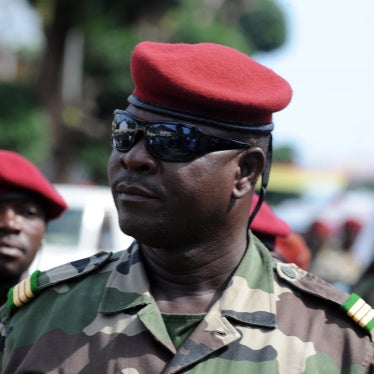Kaima, an eleven year old girl, described to Human Rights Watch how she and two of her friends were taken away by the Revolutionary United Front guerillas in Sierra Leone. She and her friends each had both hands hacked off - as part of a strategy by the rebels to terrorize the local population. Rebel forces in Sierra Leone systematically murdered, mutilated and raped civilians during their efforts to capture Freetown early this year. The rebels carried out large numbers of pre-meditated mutilations of civilians, in particular the amputation of arms, hands, legs and other parts of the body.
The victims of crimes against humanity in Sierra Leone have no international tribunal to look to for justice for the murder, torture and mutilation there. The plight of the juvenile amputees underscores the humanitarian imperative in the early establishment of the permanent International Criminal Court agreed to in Rome last summer. One year after the completion of the treaty creating the ICC, eighty-three states, including all of the United States's closest allies, have committed themselves to supporting the Court.
The groundwork for ratification of the treaty is being laid at regional conferences of states and nongovernmental partners from southern Africa to the Caribbean. Resolutions from the European Parliament, the Council of Europe, the Commonwealth Law Ministers and other parliamentarians are infusing the momentum with a sense of inevitability. With sufficient political will, the establishment of the ICC is now a matter of time.
Last week, negotiators resumed work at UN headquarters on the Court's rules of procedure and evidence, along with the elements for proving war crimes. The meeting room, packed as never before with delegates from around the world, generated an almost palpable sense of expectation that the Court was coming to life and its birth was likely to be quite a bit sooner than anyone had expected. It is quite a distance from this time last year when the US insisted on a weakened Court and then threatened to kill the Court when its views were not accepted.
While the ill-conceived threats of active US opposition to the ICC have not chilled enthusiasm among the states supporting the Court, unfortunately, Washington is still seeking to eviscerate the Court behind closed doors. It is past time for Washington to recognize the train is leaving the station and the US is in danger of being left standing on the platform. This prospect is extremely embarrassing for the Clinton Administration which already found itself - alone with only six other states, including China, Iraq, and Libya - shamefully voting against the Court treaty in July 1998.
US opposition to this new international law enforcement institution undercuts the credibility of its efforts to bring other war criminals like Slobodan Milosevic to justice. But Washington's illogical hostility to the ICC is more than a public relations disaster. It is a policy catastrophe. In operational terms, among the 19 members of NATO, only the US and Turkey have not signed the treaty. This could create real problems in any future NATO actions.
The rigid US government opposition is all the more perplexing because American negotiators obtained nearly all of the demands they made in the treaty negotiations. Motivated by the desire to prevent politically triggered cases against American servicemen and policy-makers, the US delegation achieved more than 90% of its objectives in the treaty negotiations. But the US is still insisting on an exemption for American citizens in the form of an ironclad guarantee that no American would ever appear before the ICC. No matter how much states want the US on board, they have rejected this impossible demand.
The US delegation is currently conducting intensive bilateral meetings at the UN and looking for a "fix" that will get it out of the corner it short-sightedly painted itself into. Because of the value of active US support for the Court, states want to bring the American on board - but not at the price of destroying the ICC's effectiveness and credibility. The reports from the US-convened bilaterals these last two weeks indicate Washington "just doesn't get it." The US is serving up a combination of old and new proposals that are totally unacceptable.
The word in the corridors at the UN is that US officials are soliciting acceptance for two basic demands. The American delegation wants a "binding formula" which would ensure "maximum protection" for US servicemen engaged in "official duties" in international security operations. This, of course, would not only apply to Americans and would be generalized to mean protection for individuals of any state involved in these operations. It is a similar proposal to the one the Americans floated at the eleventh hour in Rome and was decisively rejected because of the obvious loopholes it would create. This stale provision - which future Saddam Husseins would surely invoke when their troops invade a Kuwait - is no more acceptable now than it was a year ago.
In situations where individuals (meaning Americans, but again applying to all accused equally) were under investigation by the ICC, the US is seeking to deny the ICC judges the ultimate decision-making authority to find that the national authorities have failed to investigate or prosecute crimes. This failure by national court is the prerequisite for any ICC action. Some reports indicate the US wants the state of the nationality of the accused to make the decision whether the ICC can prosecute. Other reports suggest the US is proposing a vaguely formulated committee of eminent jurists which would, instead of the ICC, make the decision on admissibility. In either case, the American proposal seeks to deny the Court the authority to determine its own docket.
The US needs to respect the integrity of the ICC treaty and make proposals consistent with the text approved by a vote of 120 states to 7. Rather than try to obtain through the backdoor what they couldn't gain through last year's negotiations, the US must identify a realistic bottom line. It must seek through the negotiations on rules of procedure and elements of crimes assurances, that while not ironclad, will provide additional reassurance. To do otherwise will be to squander an opportunity that will haunt US policy makers for decades.
Perhaps most important, it is also a decision that could forever haunt victims of crimes in Sierra Leone and other shattered societies seeking to build a future based on justice for past atrocities.









